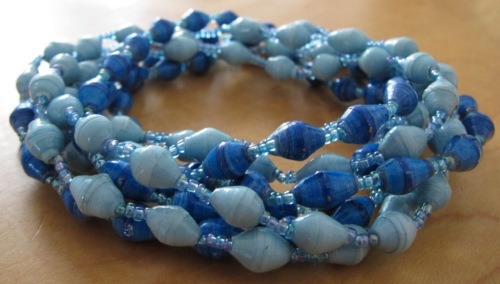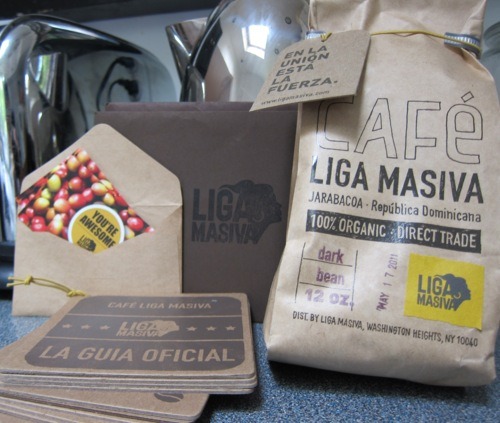I spent last Saturday at the Cultural Survival Bazaar selling jewelry for Project Have Hope in support of its work with a group of women in the Acholi Quarter of Uganda. Man, was that some easy selling! I wish I had taken a picture of the setup: two tables covered in baskets brimming with brightly-colored earrings and bracelets, surrounded by stands hung with equally vibrant strands of beaded necklaces. Nearly everyone who passed by was drawn in; most immediately thrust a hand into one of the piles of bangles or slowly reached out to run a finger along a necklace, hypnotized as it swung slowly in the breeze. Most were also shocked to feel the lightness of the jewelry – each bead is hand-made from scrap paper collected from a local printing press by the women who make up Project Have Hope. The rainbow of colors comes from the paper itself, with each piece being made even more vibrant by a coat of clear varnish.

The first time I saw these beads, they were on the wrist of Project Have Hope’s founder, Karen Sparacio at a “Social Change-Up” networking event put on by the New Prosperity Initiative. It took about five minutes of conversation for me to buy into her vision. She seeks to empower the women of the Acholi Quarter in Uganda through a comprehensive set of programs including vocational and literacy training, microloans, and agricultural development. Additionally, PHH helps arrange one-on-one sponsorship of children from the Acholi Quarter to attend good schools and provides for their daily needs beyond tuition. Karen made it clear that it was important to her that the organization helps the women become self-sufficient and that their own work funds the programs. PHH does not just throw money at a problem, but helps the Ugandan women take their future into their own hands. Later, as I read more about Project Have Hope on its website, I was even more impressed by the carefully thought-out, complementary set of initiatives that really treats the women and their community with respect.
By the end of our conversation that first night, I was drowning Karen in offers of help, with a level of enthusiasm that probably seemed strange to her. “I have a business degree! If you ever need anything, just call!” I couldn’t immediately figure out what had led to such an over-zealous reaction. Project Have Hope definitely falls into my sweet-spot of organizations I get excited about. Her work seeks to empower a group of marginalized women by educating them and giving them the tools they need to create their own success. But there was something more. After thinking over our interaction, I realized that I had been responding to Karen’s energy: she seemed exhausted.
Not that Karen lacks energy. She needs plenty to in order to accomplish everything she does. She is the only American staff member of Project Have Hope, yet bead sales (which mostly occur here) accounted for nearly $150,000 in revenues to be reinvested in the women and programs last year. (The rest of the staff is Ugandan, which is another thing I love about this organization: the Ugandan women are not just beneficiaries, they are leaders, too.) Karen did this with the aid of volunteers and interns, but while simultaneously supporting herself with her work as a professional photographer; she does not make any money from her work with PHH [note: Karen just let me know that she does now make a very small salary for her work with PHH, although she continues to support herself with her photography].
When she talked about the women who were now running their own businesses and putting their children into good schools, she showed a real passion and enthusiasm for the work. Her eyes lit up when discussing possibilities for the future of the venture and where she saw it going; however, she didn’t talk about it like someone who had started a non-profit because she just liked helping people. She talked about her work as though she had to do it. She had met these women who had been displaced from their homes by war, heard their stories and needed to help them. In the beautiful beads they made, she saw the seed of a potential solution and before she knew what was happening, Project Have Hope had taken on a life of its own. It was that kind of energy I was so drawn to and I hope to continue to support however I can.
You can read more about Project Have Hope in its annual report, which is full of Karen’s beautiful photographs or you can buy some beads for yourself here.
